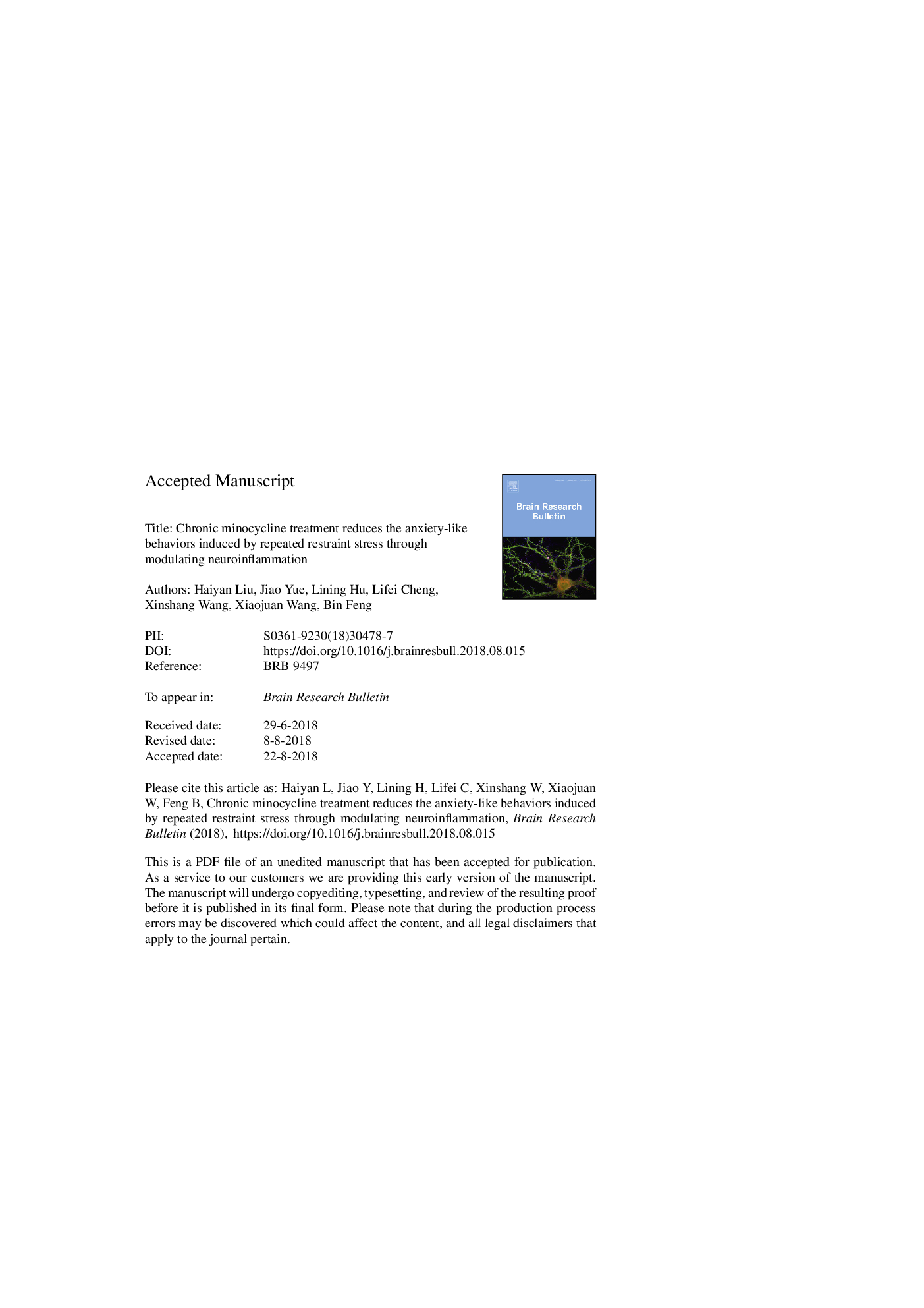| کد مقاله | کد نشریه | سال انتشار | مقاله انگلیسی | نسخه تمام متن |
|---|---|---|---|---|
| 11017883 | 1720565 | 2018 | 27 صفحه PDF | دانلود رایگان |
عنوان انگلیسی مقاله ISI
Chronic minocycline treatment reduces the anxiety-like behaviors induced by repeated restraint stress through modulating neuroinflammation
ترجمه فارسی عنوان
درمان مزمن مینوسیکلین باعث کاهش رفتارهای اضطرابی ناشی از استرس استرس مکرر توسط مدولاسیون التهاب عصبی
دانلود مقاله + سفارش ترجمه
دانلود مقاله ISI انگلیسی
رایگان برای ایرانیان
کلمات کلیدی
NF-κBRepeated restraint stressRRSOFTEPMIL-6PPAR-γElevated plus-maze test - آزمایش مزرعه ای به اضافهOpen field test - آزمایش میدان بازNeuroinflammation - التهاب عصبیinterleukin 6 - اینترلوکین 6tumor necrosis factor alpha - تومور نکروز عامل آلفاAnxiety-like behaviors - رفتارهای اضطراب مانندTNF-α - فاکتور نکروز توموری آلفاnuclear factor kappa B - فاکتور هسته ای کاپا BMinocycline - مینوسایکلینPeroxisome proliferator-activated receptor gamma - گاما گیرنده گیرنده فعال پرولیفیزوم فعال
موضوعات مرتبط
علوم زیستی و بیوفناوری
علم عصب شناسی
علوم اعصاب سلولی و مولکولی
چکیده انگلیسی
Anxiety disorders are chronic, disabling conditions across the world, and bring a great burden to individuals and society. Although advances have been made in understanding of the pathophysiology of these diseases, no mechanistically new drugs for anxiety disorders have reached the market in the past two decades. Some evidence indicates that stress increases neuroinflammatory signaling, which is related to the development of anxiety and depression. Minocycline, a broad-spectrum tetracycline-antibiotic, has been reported to suppress microglia activation-mediated brain endogenous inflammation. However, it is still unknown whether minocycline can be developed to treat stress-induced anxiety disorders and what is the underlying mechanisms. We chose the anxiety model induced by repeated stress consisting of 2âh of restraint on each of 7 consecutive days. The behavioral test results showed that chronic minocycline treatment, not acute minocycline treatment, increased the time spent in the center area in the open field test and the number of open arm entries and time spent in open arms in the elevated plus maze test, which were comparable with the effect of buspirone. Further mechanism studies demonstrated that chronic minocycline treatment inhibited the microglia activation and decreased the levels of interleukin 6 (IL-6) and tumor necrosis factor alpha (TNF-α). In addition, peroxisome proliferator-activated receptor gamma/ nuclear factor kappa B (PPAR-γ/NF-κB) signaling pathway was also modulated by chronic minocycline treatment. In conclusion, our findings support the hypothesis that immune dysregulation plays an important role in stress-induced anxiety disorders, and minocycline can be developed to be used in these diseases.
ناشر
Database: Elsevier - ScienceDirect (ساینس دایرکت)
Journal: Brain Research Bulletin - Volume 143, October 2018, Pages 19-26
Journal: Brain Research Bulletin - Volume 143, October 2018, Pages 19-26
نویسندگان
Hai-Yan Liu, Jiao Yue, Li-Ning Hu, Li-Fei Cheng, Xin-Shang Wang, Xiao-Juan Wang, Bin Feng,
